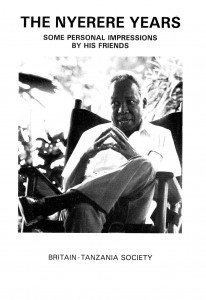Many hundreds of people have contributed to the columns of Tanzanian Affairs over the years. Sadly, many of them are no longer with us.
We would like to have presented, in this special issue, extracts from all of them but constraints of space and time make this impossible. We have also had to restrict the period covered for the same reasons. We decided that the earlier contributions, because of their historical significance, would be of the greatest interest, and the contributions mentioned below are all from the first fifty editions of TA. For those not seeing their contributions mentioned, we are sorry; but hope this will not discourage you from contributing again.
We can hardly thank enough all the people who have contributed, none of whom asked to be paid. Without them we must wonder whether TA would ever have existed.
I also feel privileged to have met so many of them and to have benefited from the wealth of knowledge and experience they have shared with us.
So, thank you again.
David Brewin (Editor).
Mwalimu Julius K. Nyerere, whose name must have appeared in almost every edition of Tanzanian Affairs since the beginning (in 1975), paid tribute to TA in our 50th edition.
Graham Mytten contributed a regular digest of Tanzanian News in the 1970s.
John Arnold wrote on many subjects when he was the second editor of Tanzanian Affairs, in particular, on the ‘ideological war’ over villagisation in the eighties.
Roger Carter, co-founder of the Britain-Tanzania Society, wrote a regular column on the economy for many years.
David Leishman. The first of his many contributions was in 1978.
Jill Shankleman, FAO Advisor, reviewed Andrew Coulson’s article on agricultural policies in Tanzania in 1979 (followed by many other articles over the years).
Professor Reginald Green wrote several robust articles on Tanzania’s economy in the 1980s.
Ann Brumfit reviewed an article on language development in 1981.
Martha Honey reviewed a BBC broadcast on the controversial Preventive Detention Act in 1982.
Peter White of the Polytechnic of Central London wrote on the bus and coach industry.
The Right Rev George Biggs, who was a missionary priest (mostly in Masasi) from 1937 to 1973, gave his impressions on returning to Tanzania after many years as Bishop of the Seychelles.
In July 1982 Ruth Carr reviewed a book comparing Tanzanian and Mozambican policies on rural development and came down heavily in favour of the latter.
N M Mulokozi of the Institute of Kiswahili Research in Dar University was full of praise for the two-volume novel by Aniceti Kitereza on peasant life in Ukerewe in pre-colonial times.
Professor C K Omari of Dar University wrote on the interaction of religion and society in 1983.
Philip Raikes contributed a comprehensive piece on the history of coffee in Tanzania in 1984.
President Kenneth Kaunda of Zambia, Bishop Trevor Huddleston and Sir Shridath Ramphal, former Commonwealth Secretary General, paid tribute to Mwalimu Nyerere on his retirement in edition no. 22.
Peter Yeo contributed several articles on the co-operative movement in Tanzania over the years.
Professor G R V Omari, Vice- Chancellor, Sokoine University of Agriculture, was a constructive critic of Tanzanian Affairs in the 1980s.
Peter Chonja reviewed the report of the Presidential Commission on Education in 1986.
Christine Lawrence, a pillar of support over many years, together with a friend, Shirin Spencer, reviewed a performance in London by actors, singers and dancers from the Bagamoyo College of Art. Described as a fusion of Tanzanian and British traditional music with jazz, rock and pure drumming (plus the ‘Tanzanian Tango’), the production was titled ‘Nutcracker – A Village Party’.
Professor Juma Ngassongwa, who was later to become a Cabinet Minister for many years, contributed an analysis of ‘Peasant Farming in the time of President Nyerere’ to a 16-page supplement on agriculture in edition no. 24.
Sir Roger Swynnerton, President of the Tropical Agricultural Association, wrote an obituary in 1987 on George Lock, who from 1930 to 1959 had devoted his agricultural service in Tanganyika to sisal research, the development of sisal crop husbandry and the improvement of sisal fibre processing at a time when the country was the biggest producer of sisal in the world.
In 1987 S A V Bowman wrote a letter to the editor in which he said that “Tanzanian politics, evidently the main preoccupation of the Bulletin (as it was then known) are, to me, the least interesting aspects of the country….”.
In 1989, James S Read, Professor of Comparative Law in London University (and later Senior Lecturer in Law at Dar es Salaam University College), a frequent contributor, wrote an article on ‘Justice in Tanzania – Lessons for England’.
Reviewing in 1989 a highly critical article on a World Bank Urban Shelter Project, Dr Carole Rakodi, at that time a Lecturer in Town Planning at the University of Wales, pointed out that the author was wrong to treat the Bank as a scapegoat and had ignored mismanagement in Tanzania (for example, the abolition of local government) and class tensions within the local population.
Mrs Keiko Collins, a book translator, and Mrs Midori Uno of NHK Radio Japan, contributed two articles (‘Tanzania and Japan’ and ‘Tanzania and I’) in edition no. 33 which explained how wrong Mrs Uno had found Japanese preconceptions about Tanzania to be when she went there as a volunteer and how there had been, since 1978, a Japan -Tanzania Association whose membership included three former Japanese ambassadors in Dar es Salaam.
Basil Hoare, a consultant in agricultural extension and training and a former staff member of the FAO in Rome, contributed frequently to TA.
T C E Congdon, Estates Director of Brooke Bond Tanzania Ltd wrote in 1989 an unusual and amusing analysis of the flora and fauna of a golf course, under the title ‘Nine holes in Mufindi’.
Mrs Eirlys Park, at one time a local correspondent to ‘The East African’ and the ‘Tanzania Standard’, wrote in no. 34 about the large collection of Makonde sculpture, built up by the Maides family, then living in Arusha.
Dr Mark Horton, the well known TV archaeologist who has done a great deal of work in Tanzania, first contributed to TA in 1990.
Dr Noel Thomas, Principal of the Teacher Training College in Swaziland, who has contributed many times to TA, reviewed an article on ‘Education and Culture of Tanzanian Teachers’ in no. 35.
In 1990 ‘A History of Leprosy in Tanzania’ was reviewed by Dr Peter Christie, a consultant paediatrician who advised on family planning in Tanzania.
Dr James Scullion wrote about ‘Grassroots Strategies in the Fisheries Industry’ in no. 36.
Dr Per Eklund, a Swedish researcher/consultant on rural development, wrote about population pressure and fertilizer policy in no. 36.
Dr Deborah Bryceson wrote on famine in East Africa in no. 37.
Geoffrey Wilkinson served in the Agricultural Department in Zanzibar from 1948 to 1954. In TA no. 41 he reviewed ‘Just Your Cup of Tea’ a collection of stories about the early years of tea development at Mufindi.
Sir James Farquharson, the former head of the East African Railways, wrote in no. 42 (a special issue called Mageuzi at the start of multi-party politics in Tanzania) on the discussions with the World Bank on the proposed Tanzania/Zambia Railway before the Chinese offered to construct it.
Judith Holland organised, very effectively, many seminars and other gatherings for the Britain Tanzania Society for several years.
In no. 43 in 1992 John Leonhardt, a biologist, wrote a review of a BBC programme, ‘Mpingo: The Tree that Makes Music’, whose wood was described as the only material from which you could make clarinets.
In no. 44 Cheridah Coppard, who described herself as ‘an amateur bird watcher’ reviewed an article by the International Council for Bird Preservation.
Those interested in the traditional musical instruments of Tanzania enjoyed the review of a book on the subject in 1993 by John Brearly, then an ethnomusicology student.
‘Suddenly, with a speed I did not believe possible for a beast of such vast, barrel-like proportions, a hippopotamus rose beneath us’. So began an exciting article in No. 46 by Ben Freeth, who described himself as a sky jumper.
In 1993 Professor Gelase Mutahaba, then Director of the Administration Division of the Commonwealth Secretariat, wrote a review of a comparative study of Public Sector Personnel Management in three African countries, including Tanzania.
Bevan Waide, then Advisor to the Parastatal Reform Commission, wrote in no. 49 a critical review of a study of state enterprises in Tanzania following nationalisation. There had been many problems but also many constructive initiatives He concluded that policy towards the parastatal system had changed as dramatically and almost as rapidly in Tanzania as similar policies in Hungary or Poland, but without a change in the ruling party.
Well- known Law Professor Issa Shivji made available to us in no. 50 an interview he had given to Haramata on the report of the Presidential Commission of Inquiry into Land Matters.
Chief Justice Francis Nyalali gave a wide-ranging and revealing speech at SOAS in 1994 which described how the functions and power of the judiciary had changed substantially during the early years of independence. It was published in TA.
Dr Margaret Snyder, founding director of the UN Development Fund for Women (UNIFEM), whose first book (written with Mary Tadesse) was ‘African Women and Development’, reviewed a controversial book about Ukimwi (AIDS) in 1993.


